Stuttering Didn't Stop Them: Some "Famous People Who Stutter"
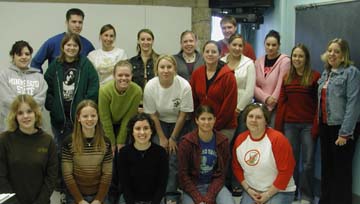 |
About the presenters: The presenters for this paper consist of the spring 2004 undergraduate class in fluency and fluency disorders at Minnesota State University, Mankato. Class members were: Meggon Anderson, Jodi Frestedt, Lindsay Gordon, Adam Goulson, Michelle Graber, Kayla Howk, Maria Jenson, Naomi Johnson, Katie Kendhammer, Jennie Kortuem, Laura Lindeman, Paul Matejcek, Julie Nelson, Kayla Pudwill, Erin Rath, Cristen Schnabel, Amanda Simon, Cassie Tepe, and Martha Winch. |
Stuttering Didn't Stop Them!
by Judy Kuster's undergraduate class in stuttering
from Minnesota, USA
This paper consists of a series of short articles with additional references about several people who stutter. Some are historical figures and some are current examples of people who stutter who haven't let stuttering interfere with their lives or careers. The short articles feature people who could be considered "Famous People Who Stutter." You can see a long list of other famous people who stutter here.
Although it is very interesting to read about famous people who stutter, it is also important to remember that there are many, many people who stutter in many, many different important careers who are also people who stutter, and who haven't let stuttering stop them either. The list below was begun by Lynda Voigt. It provides a glimpse of some "every-day"occupations of people who stutter.
 Accountant AccountantActor Administrative assistant Air Traffic controller Attorney Auctioneer Artist Audiologist |
 Author AuthorBank Examiner Budget Analyst Cancer Research Scientist Captain, US Navy Certified Public Accountant Chemist Company Owners |
 Computer Programmer Computer ProgrammerContractor Corporate Human Resources Manager Counselor Data technician Database Manager |
 Dentist DentistDoctor Educator Electronics Technician Executive of Large Corporations Executive Secretary Expert Witness, Real Estate Fashion Designer |
 Financial Planner Financial PlannerFlower shop owner Graduate dean Grants and Contract Specialist Graphic Artist Heating/Air Conditioning Technician Insurance salesman Journalist Kindergarten Teacher |
 Land Title Examiner Land Title ExaminerLawyer Legal Assistant Lieutenant Colonel, Army Locksmith Management Medical Technologist Meteorologist Middle School Teacher Minister |
 Locksmith LocksmithMedical Technologist Meteorologist Middle School Teacher Minister Motivational Speaker Newspaper Reporter Pediatric Neurosurgeon |
 Pharmacist PharmacistPhotographer Physicist Plumber Police officer Newspaper Reporter Pediatric Neurosurgeon Pharmacist Photographer Physicist |
 Plumber PlumberPolice officer Priest Principal Engineer Professor Proofreader Public Relations Consultant Psychologist Rabbi Real Estate Appraiser |
 Realtor RealtorRegistered Nurse, Operating Room Retail Store Owner Sales and Marketing |
 Sergeant First Class, US Army Sergeant First Class, US ArmyService Manager Social Worker Sociologist Software Engineer Speech Language Pathologist Singer TV News Reporter |
 University Professor University ProfessorUS Senator Vice President of an International Company Veterinarian Voice (singing) Teacher Writer |
Robert Boyle - by Lindsay Gordan
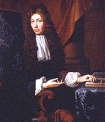 Robert Boyle born January 25, 1627 is known as the "Father of Modern Chemistry." Boyle's father was Richard Boyle, Earl of Cork, Waterford, who was the richest man in Great Britain. As a young child Robert's father sent him away to be brought up in the country. Shortly after this, Robert's mother passed away. At this time Boyle's stutter became apparent. John Clay writes that Boyle claimed he acquired this from mixing with other children of a humbler background than himself but of the same age, learning this stutter by imitation of these children. However, the acquisition of this stutter was shortly after his mother died and it was made worse by being in the company of other children, and being far from home.
Robert Boyle born January 25, 1627 is known as the "Father of Modern Chemistry." Boyle's father was Richard Boyle, Earl of Cork, Waterford, who was the richest man in Great Britain. As a young child Robert's father sent him away to be brought up in the country. Shortly after this, Robert's mother passed away. At this time Boyle's stutter became apparent. John Clay writes that Boyle claimed he acquired this from mixing with other children of a humbler background than himself but of the same age, learning this stutter by imitation of these children. However, the acquisition of this stutter was shortly after his mother died and it was made worse by being in the company of other children, and being far from home.
Boyle received the finest education his entire life. He first attended school at Eton; he also traveled around the continent with a tutor and his brother, and was able to master six languages. In this time Boyle also became interested in physical scientists theories on air and vacuum. He began to publish articles on a variety of fields of science, philosophy, and theology. Boyle wrote about both successful and unsuccessful experiments. One of these published articles was written about the pressure-volume inverse relationship which later became known as Boyle's law. Boyle also discussed the idea of an element in "The Sceptical Chemist" where he argued against Aristotle's view of the four elements of earth, air, fire and water.
Although Robert Boyle faced challenges in his life such as his mother passing away when he was a young child and growing up a person who stutters, he was able to overcome these difficulties. Robert Boyle is most widely known for Boyle's Law but also contributed much in the development of chemistry.
For more information:
- http;//www.woodrow.org/teachers/ci/1992/Boyle.html
- http://www-groups.dcs.st-and.ac.uk/~history/Mathematicians/Boyle.html
Lewis Carroll - by Meggon Anderson
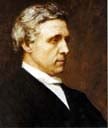 Charles Lutwidge Dodgson, later took the name, Lewis Carroll, was in 1832, the third of eleven children and the first son born to an upper middle class, English, Irish and very Catholic family. When Charles was eleven his family moved to Croft in North Yorkshire and one year later he was sent to a small private school in Richmond where he was reportedly very happy. Somewhere between 1845 and 1846, Charles transferred to a Rugby school where he stayed for 3 years. Although many report he was extremely unhappy at his new school, this is where he started writing his first magazines as entertainment for his brothers and sisters.
Charles Lutwidge Dodgson, later took the name, Lewis Carroll, was in 1832, the third of eleven children and the first son born to an upper middle class, English, Irish and very Catholic family. When Charles was eleven his family moved to Croft in North Yorkshire and one year later he was sent to a small private school in Richmond where he was reportedly very happy. Somewhere between 1845 and 1846, Charles transferred to a Rugby school where he stayed for 3 years. Although many report he was extremely unhappy at his new school, this is where he started writing his first magazines as entertainment for his brothers and sisters.
In 1851, Charles started teaching at his father's old school, Christ Church, where he received many high honor awards. One of his most famous stories, "Alice's Adventure in Wonderland," was published in 1865. This children's story was based loosely on his young friend, Alice Liddell who was the Dean of the Christ Church's daughter. The story was first meant to be a children's novel to entertain the 3 daughters of Mr. Liddell while on trips they would take together. Seven years later he published another famous piece entitled "Looking through the Glass."
As a child, he noticed what he called a "hesitation." Some say he only stammered when speaking to adults. Others say that children noticed his stammer more than adults did. Although he sometimes obsessed over his stammer, he never let it interfere with his social or academic life. He loved attention and loved to sing in front of an audience. He is remembered as being somewhat of a performer who told stories, engaged in games of charades, and performed magic tricks for his family. Ladies found him attractive and irresistible.
Lewis Carroll died in 1898 in his Guildford home of pneumonia.
For more information:
- http://www.victorianweb.org/authors/carroll/bio1.html
- http://www.lewiscarroll.org/cam/to1862.html
- http://www.poets.org/poets/poets.cfm?prmID=79
- http://www.insite.com.br/rodrigo/text/lewis_carroll.html
- http://www.lewis-carroll-birthplace.org.uk/
Sir Winston Churchill - by Martha Winch
 Sir Winston Leonard Spencer Churchill was born in Blenheim Palace, Woodstock on November 30th, 1874. He married and had five children, four of which lived to be adults. Churchill was educated at Harrow and Sandhurst before a brief career in the army. At the age of 26, Churchill became a Conservative Member of Parliament. Over the next three decades he held many high positions in the government and soon after the start of WWII he was appointed Prime Minister and Minister of Defense.
Sir Winston Leonard Spencer Churchill was born in Blenheim Palace, Woodstock on November 30th, 1874. He married and had five children, four of which lived to be adults. Churchill was educated at Harrow and Sandhurst before a brief career in the army. At the age of 26, Churchill became a Conservative Member of Parliament. Over the next three decades he held many high positions in the government and soon after the start of WWII he was appointed Prime Minister and Minister of Defense.
During the War, he was under constant attack by the Germans, but refused their offers of peace. Instead, he organized an air attack which let to the victory of the Battle of Britain and also held off Hitler's ally, Mussolini, in Italy. Churchill decided his plans of attack on a whim, and it worked not only to infuriate Hitler, but also had Churchill's advisors worked up. Churchill needed allies, but the President of the United States, Franklin D. Roosevelt, was reluctant to rally with Churchill until Japan bombed Pearl Harbor. Once the U. S. had entered the war, Churchill felt he was more likely able to defeat Germany and Japan. And so the Big Three (Churchill, Roosevelt, and Premier Josef Stalin) met to discuss what actions to take.
Winston Churchill was a person who stuttered. Excerpts from Churchill's famous speech "Iron Curtain" show classic symptoms of stuttering behavior. It is debated about why he was so fluent when giving his speeches. Some people argue that for him, stuttering became less frequent when speaking in front of a crowd.
For more information:
- http://www.winstonchurchill.org/i4a/pages/index.cfm?pageid=100
- http://www.spartacus.schoolnet.co.uk/PRchurchill.htm
- http://www.stutteringhelp.org/pressrm/chrchill.htm
- http://www.churchill.nls.ac.uk/
Claudius I - by Kayla Howk
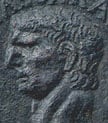 Claudius Nero Grermanicus was the son of Drusus Claudius Nero and Antonia, born on August 1, 10 BC. He had two siblings, a brother, Germanicus and a sister, Livilla. His father died when Claudius was only one year old and his uncle became emperor later in 14 AD. When his uncle became emperor, he adopted Germanicus, which put him in line to become emperor of Rome. It has been written that Cladius was never meant to become a Roman emperor. Unfortunately his brother, who was next in line, died in 19 AD.
Claudius Nero Grermanicus was the son of Drusus Claudius Nero and Antonia, born on August 1, 10 BC. He had two siblings, a brother, Germanicus and a sister, Livilla. His father died when Claudius was only one year old and his uncle became emperor later in 14 AD. When his uncle became emperor, he adopted Germanicus, which put him in line to become emperor of Rome. It has been written that Cladius was never meant to become a Roman emperor. Unfortunately his brother, who was next in line, died in 19 AD.
Claudius was born with certain features that lead his family to believe he was a timid, unintelligent, boy with mental infirmities. He limped, drooled, stuttered and was constantly sick. Some speculate he may have had cerebral palsy. Because of his disability, his family kept him out of the public eye. Claudius spent his free time reading, and became skilled in the liberal arts. With his study of history, Claudius became knowledgeable about governmental institutions.
Claudius's nephew, Gaius, became ruler in 37 AD and appointed Claudius, as a joke, to consulship. In 41 AD, Gaius was killed and Claudius became the next Roman Emperor. There are several different stories on how this occurred, one of which tells how in chaos, Soldiers of Practorian Guard found Claudius hiding behind curtains. They declared him emperor and carried him off to their camp, where later the Senate was forced to accept this new ruler. Other stories tell how Claudius participated in his rise to power.
Claudius's most important accomplishment as an emperor was the invasion and annexation of Britain. He is also credited for his actions of aristocracy, his judicial practices and the treatment of provinces. Today it is debated if the later actions should be regarded as good government practices or as interference of government.
For more information:
- http://www.bible-history.com/nero/NEROClaudius.htm
- http://www.roman-emperors.org/claudius.htm
- http://www.anselm.edu/internet/classics/I,CLAUDIUS/
- http://www.library.thinkquest.org/26907/emperors/claudius.htm
- http://www.historyinfilm.com/claudius/classics/12caesars/claudius.htm
- http://www.geocities.com/Athens/Acropolis/1843/Claudius.htm/
Hazen "Kiki" Cuyler - by Michelle Graber
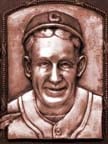 Hazen "Kiki" Cuyler was a Hall of Fame outfielder for the Pittsburgh Pirates in the 1920s. He was reportedly a "quiet" person and his nickname was pronounced with long "I's" because he stuttered and often pronounced his last name Ky-ky-ler. He was born in 1898 in Harrisville, Michigan, a small community that produced a major league baseball player known for his powerful line-drive hits, stolen base titles, exeptional fielding skills and great batting average.
Hazen "Kiki" Cuyler was a Hall of Fame outfielder for the Pittsburgh Pirates in the 1920s. He was reportedly a "quiet" person and his nickname was pronounced with long "I's" because he stuttered and often pronounced his last name Ky-ky-ler. He was born in 1898 in Harrisville, Michigan, a small community that produced a major league baseball player known for his powerful line-drive hits, stolen base titles, exeptional fielding skills and great batting average.
Cuyler began his professional baseball career playing with the pennant-winning Pittsburgh Pirates from 1921 to 1927. During his rookie years, the right-hander led the National League in triples and runs, while maintaining an execptional batting average. In 1925, he batted .357 and led the Pirates to the National League pennant and the World Series. In the seven-game series versus the Washington Senators, Cuyler emerged as a true hero, batting .269 and making phenomenal catches. In game 7, with the series tied at 3 games even, Cuyler hit an eighth inning two-run double off Walter Johnson that clinched the victory for the Pirates. His spectacular performance throughout the 1925 season led to a spot on the All Star team that year.
In 1928, Cuyler was traded to the Chicago Cubs, where he continued his hot streak for the next 7 1/2 seasons. While playing for the Cubs, Cuyler and his teammates won pennants in 1929 and 1932. In the last few years of his professional career, Cuyler played for the Cincinnati Reds from 1935 to 1937, and ended his outstanding career as a part-time outfielder for the Brooklyn Dodgers in 1938. Years later, he joined the coaching staff of the Chicago Cubs, and later the Boston Red Sox before passing away just prior to the pre-season of 1950. Cuyler was elected to the National Baseball Hall of Fame by the Committee on Baseball Veterans in 1968.
Some interesting statistics on "Kiki" Cuyler:
- Led the NL in stolen bases in 1926, 1928, 1929, & 1930.
- Batted .354 in 1924, .357 in 1925, .360 in 1929, and .355 in 1930.
- Lifetime total of 2299 hits.
- Lifetime batting average .321.
- Named to All Star Team in 1925.
For additional information:
- http://www.baseballhalloffame.org/hofers_and_honorees/hofer_bios/cuyler_kiki.htm
- http://www.findagrave.com
- http://www.baseballhistorian.com/html/american_heroes.cfm?page=55
- http://www.baseball-statistics.com/HOF/Cuyler.html
- http://http://members.aol.com/cjroach/famousstutterers.html
- http://www.royal.gov.uk/output/Page147.asp
- http://www.royal.gov.uk/output/page923.asp
- http://histclo.hispeed.com/royal/eng/royal-ukg6.htm
King George VI - by Katie Kendhammer
 King George VI was born in 1895 as Albert Frederick Arthur George Windsor, Prince of England. He grew up with a mother who was criticized for being cold and indifferent around her children, and with a father who was known as a harsh disciplinarian. He had 4 brothers and one sister. He has been described as a temperamental child, prone to sudden outbursts of temper. He developed what the English call a stammer or stutter, early on as a child. King George's father was bothered by the fact that his son stuttered and would frequently mock him in order of trying to cure him. King George served in the Navy during World War I as a sub-lieutenant. He assumed that he would make a career out of the Navy as he was never supposed to be king. His older brother abdicated the throne, and King George was thrust into the limelight. In 1923 he married his wife, Elizabeth Bowes-Lyon. King George sought help from a speech therapist once king, in order to help him cope with his public addresses. He developed a very unique style of speaking, which would include long pauses, hoping to disguise and minimize his stuttering. He died in 1952. It was believed that smoking and stress had taken its toll on him.
King George VI was born in 1895 as Albert Frederick Arthur George Windsor, Prince of England. He grew up with a mother who was criticized for being cold and indifferent around her children, and with a father who was known as a harsh disciplinarian. He had 4 brothers and one sister. He has been described as a temperamental child, prone to sudden outbursts of temper. He developed what the English call a stammer or stutter, early on as a child. King George's father was bothered by the fact that his son stuttered and would frequently mock him in order of trying to cure him. King George served in the Navy during World War I as a sub-lieutenant. He assumed that he would make a career out of the Navy as he was never supposed to be king. His older brother abdicated the throne, and King George was thrust into the limelight. In 1923 he married his wife, Elizabeth Bowes-Lyon. King George sought help from a speech therapist once king, in order to help him cope with his public addresses. He developed a very unique style of speaking, which would include long pauses, hoping to disguise and minimize his stuttering. He died in 1952. It was believed that smoking and stress had taken its toll on him.
For more information:
- http://www.law.umkc.edu/faculty/projects/ftrials/salem/SAL_BMAT.HTM
- http://www.georgetown.edu/faculty
- http://www.puritansermons.com/bio/biomathe.htm http://college.hmco.com/english/health/syllabuild/guide/mather.html
Cotton Mather - by Amanda Simon
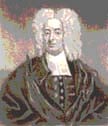 Although Cotton Mather (1663 - 1728) is most often associated with the famous Salem Witch Trials and his role in igniting the fear of witches and witchcraft in the late 1600's, he also had many great accomplishments in his life. The famous Puritan preacher attended Harvard as a teenager and studied writing and prayer. Cotton Mather also strived to model his father's great achievements and to live up to the high expectations his father had of him. Cotton Mather's desire to become a respected preacher was almost cast aside because of his stuttering and the fear that no one would be able to understand his sermons. By speaking slower and using a "sing-song" method, Cotton Mather learned how to accept his stuttering and go on to become an influential Puritan leader and a successful writer. He later wrote The Angel of Bethesda which was the first book in America that was about stuttering.
Although Cotton Mather (1663 - 1728) is most often associated with the famous Salem Witch Trials and his role in igniting the fear of witches and witchcraft in the late 1600's, he also had many great accomplishments in his life. The famous Puritan preacher attended Harvard as a teenager and studied writing and prayer. Cotton Mather also strived to model his father's great achievements and to live up to the high expectations his father had of him. Cotton Mather's desire to become a respected preacher was almost cast aside because of his stuttering and the fear that no one would be able to understand his sermons. By speaking slower and using a "sing-song" method, Cotton Mather learned how to accept his stuttering and go on to become an influential Puritan leader and a successful writer. He later wrote The Angel of Bethesda which was the first book in America that was about stuttering.
For more information:
- http://www.bbc.co.uk/history/historic_figures/newton_isaac.shtml
- http://www.historyguide.org/intellect/newton.html
- http://www-groups.dcs.st-and.ac.uk/~history/PictDisplay/Newton.html.
- http://www.astro.wisc.edu/~mab/education/astro103/lectures/figures/chap1/newton.jpg
Sir Isaac Newton - by Adam Goulson
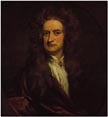 Isaac Newton was born December 25, 1642, which was January 4th, 1643 on the Gregorian calendar. He was born in Woolsthorpe, Lincolnshire which is near Grantham. He had an unhappy childhood with many emotional collapses. He was not liked and kept mostly to himself. He went to grammar school in Grantham and after that he wanted to get into Cambridge University but he first went to Trinity College. He was not a good student but he eventually got into Cambridge University. He earned a bachelors degree from Cambridge and graduated without honors or distinctions. He left Cambridge because it had to close for two years because of the plaque which was sweeping through England. He eventually came back to Cambridge University when it reopened and he worked his way up to the Lucasian Professor of Mathematics. His next accomplishment after that was he was elected the President of Royal Society in 1703. He eventually became a very influential person in the development of science. Some of his achievements are in the areas of theology, optics, and alchemy but it was his work in the area of gravity which got him his most notoriety. Isaac Newton was a person who stuttered throughout his life. Sir Isaac Newton died March 31, 1727. He is buried in Westminster Abbey.
Isaac Newton was born December 25, 1642, which was January 4th, 1643 on the Gregorian calendar. He was born in Woolsthorpe, Lincolnshire which is near Grantham. He had an unhappy childhood with many emotional collapses. He was not liked and kept mostly to himself. He went to grammar school in Grantham and after that he wanted to get into Cambridge University but he first went to Trinity College. He was not a good student but he eventually got into Cambridge University. He earned a bachelors degree from Cambridge and graduated without honors or distinctions. He left Cambridge because it had to close for two years because of the plaque which was sweeping through England. He eventually came back to Cambridge University when it reopened and he worked his way up to the Lucasian Professor of Mathematics. His next accomplishment after that was he was elected the President of Royal Society in 1703. He eventually became a very influential person in the development of science. Some of his achievements are in the areas of theology, optics, and alchemy but it was his work in the area of gravity which got him his most notoriety. Isaac Newton was a person who stuttered throughout his life. Sir Isaac Newton died March 31, 1727. He is buried in Westminster Abbey.
Kim Philby - by Laura Lindeman
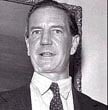 Kim Philby, born Harold Adrian Russell Philby, was a famous British spy who lived from 1912 until 1988. During the Cold War, Philby was a double agent for the Soviets, and therefore, ended up being a large help to the British cause. He first became interested in the work of the Soviet activities while he was a student attending Cambridge University in 1933. This led to his future work as the famous spy he became. Philby continued his career as a spy and double agent for years until the British finally caught on to his deception. He was too quick for them, however, by going back to Russia before he could be arrested.
Kim Philby, born Harold Adrian Russell Philby, was a famous British spy who lived from 1912 until 1988. During the Cold War, Philby was a double agent for the Soviets, and therefore, ended up being a large help to the British cause. He first became interested in the work of the Soviet activities while he was a student attending Cambridge University in 1933. This led to his future work as the famous spy he became. Philby continued his career as a spy and double agent for years until the British finally caught on to his deception. He was too quick for them, however, by going back to Russia before he could be arrested.
In his personal life, Philby displayed many of the same characteristics as in his "professional" life. Being a man who could adapt to any situation or environment, it is fitting that Philby could control his life-long stuttering to his advantage. Some have attributed his stuttering to his "strong father" whom he looked up to and admired. However, in the literature investigated, Philby's stuttering did not seem to be a large part of his character. Stuttering was only briefly mentioned and did not seem to play a large role in the overall view of his life and profession as a whole and did not appear to be a detriment, rather, an asset.
In continuation with Philby's personality, he was described as "debonair and unkempt"and "as both unfriendly and ingratiatingly smooth." Whatever the demeanor required, Philby could play the part. He also ended up being married four times. Two of the wives left their current husbands to marry Philby without ever knowing of his involvement in spying and his undercover work. He was also accused of having numerous mistresses in between the marriages.
Kim Philby truly was a man of different hats. He could rise to the occasion and come across as whatever the situation required. These characteristics made him the excellent spy that he was. His adaptations to the situation and his control over all of them added to his effectiveness. It was interesting to find that he could even control his stuttering and use it to get the upper hand. Philby's whole personality and his characteristics led him to do very well in a career where changing others' perception about oneself is critically necessary.
For more information:
- http://ei.cs.vt.edu/~history/Turing.html
- http://www.turing.org.uk/turing/http://www.sparrowsp.addr.com/television%20pages/philby_2.htmttp://www.joric.com/Conspiracy/Philby.htm
Alan Turing - by Maria Jenson
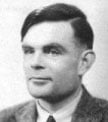 Alan Turing was born in London on the 23rd of June in 1912. He had a natural aptitude for science as a child. Once he began school, he immediately responded to math and science. He attended college first at King's College, Cambridge University, and then he studied at Princeton in the U.S. M. Mitchell Waldrop wrote an article about Turing in the The Washington Post, 06-09-1999, pp H01, ALAN TURING; The Oddball Who Changed the World. In the article he describes an eccentric individual who spoke with a stammer. "No doubt about it: Even by the eccentric standards of Cambridge University in the 1930s, Alan Turing was a mess. The young mathematics student wore a jacket and tie, of course, just as all students did in those days. But he managed to make his clothes look as though he'd bought them in a rummage sale. He never seemed to comb his hair or clean his fingernails. He often neglected to shave, since he might nick himself and would invariably faint atthe sight of blood. . . . In addition, he was rude, the kind of guy who thought it redundant to acknowledge your existence if he'd already said hello to you once that morning. And he had this . . . voice. It was a high-pitched stammer when he talked, a nervous crowing sound when he laughed and a kind of random squeak when he was lost in thought."
Alan Turing was born in London on the 23rd of June in 1912. He had a natural aptitude for science as a child. Once he began school, he immediately responded to math and science. He attended college first at King's College, Cambridge University, and then he studied at Princeton in the U.S. M. Mitchell Waldrop wrote an article about Turing in the The Washington Post, 06-09-1999, pp H01, ALAN TURING; The Oddball Who Changed the World. In the article he describes an eccentric individual who spoke with a stammer. "No doubt about it: Even by the eccentric standards of Cambridge University in the 1930s, Alan Turing was a mess. The young mathematics student wore a jacket and tie, of course, just as all students did in those days. But he managed to make his clothes look as though he'd bought them in a rummage sale. He never seemed to comb his hair or clean his fingernails. He often neglected to shave, since he might nick himself and would invariably faint atthe sight of blood. . . . In addition, he was rude, the kind of guy who thought it redundant to acknowledge your existence if he'd already said hello to you once that morning. And he had this . . . voice. It was a high-pitched stammer when he talked, a nervous crowing sound when he laughed and a kind of random squeak when he was lost in thought."
Turing worked with a German enciphering machine and other cryptological investigations. His work remained unrecognized, and he turned his attention to becoming an Olympic marathon runner for Great Britain.
Turing soon returned to his theories of creating a machine that could rival the brain. He coined the phrase, "Artificial Intelligence." He began to study at Manchester University where he wrote his famous paper, "Computing Machinery and Intelligence."
Alan Turing died on June 7, 1954. He was one of the greatest pioneers of the computer field, and is called the founder of computer science.
For more information:
- http://www.chasingthefrog.com/reelfaces/thehurricane.php
P.F. Bentley - by Kayla Pudwill
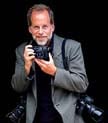 P.F. Bentley is a professional photographer. He grew up in Hawaii and later graduated from the University of Hawaii Honolulu. He is currently married to Cathy Saypol, who works as a publicist.
P.F. Bentley is a professional photographer. He grew up in Hawaii and later graduated from the University of Hawaii Honolulu. He is currently married to Cathy Saypol, who works as a publicist.
Bentley is a contemporary Time-Life photographer who has worked mainly worked with political stories that have included presidency campaigns, presidential inaugurations, and terrorist attacks. He photographed Bill Clinton in his presidential campaign in 1992 along with many other presidential campaigns since 1980. He has traveled to many countries around the world to photograph a variety of political events that have taken place in areas such as Haiti, South Korea, Europe, China, Japan, and El Salvador.
Bentley has earned many first place "Picture of the Year"awards. Bentley's pictures have been published is magazines such as TIME, The Washington Post, NEWSWEEK, and New York Times. His photographs have also been published in many newspapers and he has had the opportunity to film for Nightline and also a two hour National Geographic special called, "Inside the Capitol." Bentley has also published books such as Newt: Inside the Revolution and Clinton: Portrait of Victory.
Bentley is also person who stutters. Bentley had treatment at the Hollins Communication Research Institute and learned exercises that he feels make him more fluent. Bentley did not choose his career because it doesn't involve much speaking, but because he enjoys it. Although stuttering can have downsides, he tries not to let it get in the way of his work.
For more information:
- http://www.pfpix.com/bio.htm
- http://www.usatoday.com/mchat/20010404008/tscript.htm
- http://www.pfpix.com/bio.htm
Howard Bingham - by Erin Rath
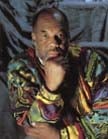 "You have to make up your mind what you want to do in life, believe in yourself and you' ll succeed." -- Howard L Bingham
"You have to make up your mind what you want to do in life, believe in yourself and you' ll succeed." -- Howard L Bingham
Howard L. Bingham has been referred to as the Forest Gump of photography. He has been in the right places at the right time to capture nearly four decades of America's historical turning points. Bingham had a rough start in photography; he failed his first class being told he wouldn't amount to anything. After his persistent efforts to get a photography job at a local paper, he was hired. Assigned to shoot Cassius Clay's fight brought a new inspiration to him. Sports photography became his new passion. Clay, who changed his name to Muhammad Ali, and Bingham's friendship grew and he became Ali's personal photographer. Some of Bingham's best known photographs are from this time.
Bingham has photographed everyone from Bill Cosby to Robert Redford. He has not had it easy being faced with fluency issues along the way. He has become a role model speaking out about his stuttering for different organizations including the National Stuttering Association.
Currently, he is working with commercials and documentary photography. American Society of Photographers and the Photographic Manufactures Distributors Association presented him the International Photographer of the Year Award for 1997. Although was always told he would never make it in the field of photography, a fter nearly forty years he is still an influential photographer.
For more information:
- http://pdngallery.com/legends/archive/bingham/profile_bingham.html
- http://www.howardbingham.com/console/bingpres.htm
- (http://www.findarticles.com/cf_dls/m1175/n6_v31/21253187/p4/article.jhtml?term=)
- http://www.howardbingham.com/console/bingpres.htm
Ruben Carter - by Paul Matejcek
 Born on May 6, 1957, in Clifton, New Jersey, Ruben Carter had a difficult childhood. His first encounter with the law came when he stabbed a man that was allegedly molesting his friend. Carter's boxing career only put him the spotlight for more trouble. He reported being taken to the police station in every city he fought in as soon as he arrived.
Born on May 6, 1957, in Clifton, New Jersey, Ruben Carter had a difficult childhood. His first encounter with the law came when he stabbed a man that was allegedly molesting his friend. Carter's boxing career only put him the spotlight for more trouble. He reported being taken to the police station in every city he fought in as soon as he arrived.
In 1966 Ruben "Hurricane" Carter had twenty one knockouts to his credit, but on the night of June 6, 1966, no boxing records mattered. Carter and a friend were arrested for a triple murder. The judge overseeing the trial was trying the first, last, and only criminal trial of his career and the jury consisted of all whites.
Neither Carter nor his friend, John Artis could be positively identified by witnesses. The two men were convicted and Carter spent the next eight years in jail before being released. In the same year he published a book entitled The 16th Round. Two years later he was convicted again of the same crime and went back to prison. He was released again on November 7 1985 for the final time. Mr. Carter currently resides in Toronto, Canada, and heads the "Association in Defense of the Wrongfully Convicted." He also serves as a member of the board of directors of the Southern Center for Human Rights in Atlanta and the Alliance for Prison Justice in Boston. A movie "The Hurricane", starring Denzell Washington as Carter was made in 1999. In 2003, Carter was a featured speaker at the Canadian Association for People Who Stutter convention.
For more information see
- http://www.johnglennhome.org/annie_glenns.html
- http://www.amarillonet.com/stories/102598/gle_wife.shtml
- http://www.nod.org/content.cfm?id=30
Annie Glenn - by Naomi Johnson
 Annie Glenn, formally known as Anna Margaret Castor, was born in 1920 in Columbus, Ohio, to Homer and Margaret Castor. A few years later the Castors moved to the small college town of New Concord, Ohio. During Annie's early years of schooling she met her "childhood playmate" John Glenn, Jr. Not many years after their introduction they became "high school sweethearts." The year following their graduation from Muskingum College, Annie and John were married.
Annie Glenn, formally known as Anna Margaret Castor, was born in 1920 in Columbus, Ohio, to Homer and Margaret Castor. A few years later the Castors moved to the small college town of New Concord, Ohio. During Annie's early years of schooling she met her "childhood playmate" John Glenn, Jr. Not many years after their introduction they became "high school sweethearts." The year following their graduation from Muskingum College, Annie and John were married.
Annie, like her father, grew up with a stutter. Strong and determined, Annie was not going to let this stop her from accomplishing her dreams. Annie doubled majored in music and education in college.
For the next thirty years Annie did not speak in public. She did not want others to negatively judge her and her husband, who was exploring his career as a Marine fighter pilot and astronaut. In 1973 Annie, bound and determined to break free from the social isolation and shame of stuttering, sought professional help at the Communication Research Institute at Hollins College in Roanoke, Virginia.
After receiving intensive therapy, Annie's life changed drastically. She finally had the confidence she needed to speak freely, but not totally fluently, in public. With this newfound confidence Annie began to speak out and encourage others with speech and language disorders, helping them to change their attitudes toward their disorder. She encouraged people with speech and language disorders to have confidence in themselves and to show that their disorder was only a small part of who they were. In 1990, in light of her accomplishment as a public figure, the National Council on Communication Disorders created the Annie Glenn Award to be given to those who have achieved distinction in their field of study in spite of a communication disorder.
For more information:
- http://www.imdb.com/name/nm0000469/bio
- http://www.npr.org/programs/anthem/bios/jejones.bio.html
Bo Jackson - by Julie Nelson
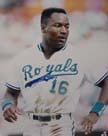 Bo Jackson is former sports star who played in both major league baseball and professional football. He won the Heisman Trophy in college while playing football for Auburn University. Then, he went on to play for the Oakland Raiders and the Cincinnati Bengals. Jackson played baseball for the Kansas City Royals, the Chicago White Sox, and the California Angels. He had many highlights during his careers in both sports. Jackson was selected to play in the NFL Pro Bowl and he was the MVP of the 1989 MLB All-Star game. He is the only man to have ever played in both games.
Bo Jackson is former sports star who played in both major league baseball and professional football. He won the Heisman Trophy in college while playing football for Auburn University. Then, he went on to play for the Oakland Raiders and the Cincinnati Bengals. Jackson played baseball for the Kansas City Royals, the Chicago White Sox, and the California Angels. He had many highlights during his careers in both sports. Jackson was selected to play in the NFL Pro Bowl and he was the MVP of the 1989 MLB All-Star game. He is the only man to have ever played in both games.
Jackson's motivation to succeed stemmed from his childhood stuttering problem. He once said, "I stuttered to where I couldn't even talk in class. I couldn't even give one-word answers because I would stutter, which in turn made me mad. I fought a lot and I stayed in trouble a lot" (Fauber, 2003). People in his hometown predicted a sad future for Jackson. He recalled, "The elderly people in my neighborhood told me that by the time I was 21, I would either be in a cemetery, or I would be in prison" (Hubbard, 2003). Their pessimistic attitudes provided him with the drive he needed to reach his fullest potential.
Currently, Jackson is married and has three children. He is the president of Bo Jackson, Inc. and the CEO of N'Genuity Enterprises. Also, he is a spokesperson for the March of Dimes. Jackson still has a mild stutter, however, he doesn't let it bother him and has many speaking engagements.
For more information:
- http://www.dallasnews.com/sharedcontent/dallas/sports/miscellaneous/reading/stories/010104dnspowherenow.55622.html
- http://www.sportsmediainc.com/wvspn/index.cfm?func=showarticle&newsid=7650&bannerregion=Beckley+Region
James Earl Jones - by Christen Schnabel
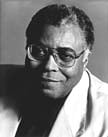
James Earl Jones was born January 17, 1931 in Arkabutla, Mississippi. He developed a severe stutter at a young age, about the time he moved to Michigan to live with his grandparents. The stuttering was such a problem that Jones became functionally mute for eight years. At that time he would rather be seen without any voice at all, than as someone who stuttered. When Jones was in high school, his English teacher felt that he would be cured of his stutter by having to recite poetry in front of an audience. This did help to alleviate Jones' stuttering, as did other acting lessons.
These acting lessons eventually lead to Jones career in acting. In fact, Jones has one of the most widely recognized voices in the country. He is best known for providing the voice of Darth Vader in the "Star Wars" trilogies and also for being the voice of Mufasa in the movie "The Lion King". Jones has been rewarded for his excellent acting skills. He has one two Tony awards, one in 1959 for "The Great White Hope," and one in 1987 for "Fences."
Jones does still claim to stutter. He says that he is very careful and always thinks about what he is saying before he says it. He also says that he is no longer bothered by the problem.
For more information see
- http://www.sterlingspeakers.com/love.htm
- http://www.aeispeakers.com/Love-BobPF.htm
Bob Love - by Jenny Korteum
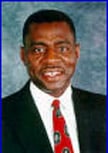 Bob "Butterbean" Love was born in Louisiana in 1943 to a family of thirteen children. His family struggled financially and his dreams of becoming a basketball star seemed far out of reach.
Bob "Butterbean" Love was born in Louisiana in 1943 to a family of thirteen children. His family struggled financially and his dreams of becoming a basketball star seemed far out of reach.
Bob Love is also a person who stutters and when he was young there were times he choose not to speak at all. In high school he grew to to be 6'8" tall and starred in basketball. After high school Love went to college and played basketball, and then he played for the Cincinnati Royals, Milwaukee Bucks, and the Chicago Bulls. Love was one of the greatest basketball players of all time, and he held team scoring records with the Chicago Bulls until they were broken by Michael Jordan. Love hurt his back and had to retire from basketball in 1977.
After he could no longer play basketball, he ended up bussing tables at the restaurant in Nordstroms in Seattle, Washington. Although it was embarrassing for him to be recognized as the famous Chicago Bull's basketball player, he worked very hard. Soon his employer noticed how hard he worked and offered to help him get speech therapy to work on his stuttering. In 1992, the Bull's vice president offered Love a job as the Community Relations Director, and Love accepted. Although he is still a person who stutters, Bob Love is a very effective communicator and makes public speeches to large crowds all the time. Recently, his Chicago Bull's basketball jersey, number 10, was retired and he married Rachel Dixon during the Bulls half-time show. At the 2003 ASHA convention in Chicago, Illinois, Love received the Individual Achievement Award from the National Council for Communicative Disorders. Presenting the award was another famous person who stutters, Annie Glenn.
For more information:
- http://www.ibiblio.org/samneill/index.html
- http://www.stammering.org/speaking_out.html
Sam Neill - by Jodi Frestadt
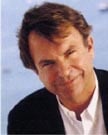 Sam Neill is an actor who was born in Northern Ireland in 1947. At the age of seven, his family moved to New Zealand, where is father was originally from. During childhood, Sam stuttered and he used many methods to avoid speaking situations. He says that he "grew out" of his stuttering during his teenage years. In school, Sam participated in drama productions and after college he pursued a career in acting with the Players Drama Quartet. In the film Sleeping Dogs, Sam became known more globally as this was the first film out of New Zealand to be released in the U.S.
Sam Neill is an actor who was born in Northern Ireland in 1947. At the age of seven, his family moved to New Zealand, where is father was originally from. During childhood, Sam stuttered and he used many methods to avoid speaking situations. He says that he "grew out" of his stuttering during his teenage years. In school, Sam participated in drama productions and after college he pursued a career in acting with the Players Drama Quartet. In the film Sleeping Dogs, Sam became known more globally as this was the first film out of New Zealand to be released in the U.S.
The most popular role that Sam has played is "Sydney Reilly" of the Thames TV series Reilly: Ace of Spies. He was extremely popular throughout Australia for over ten years before receiving world wide recognition for starring in the American film Jurassic Park. Over the years, Sam has won many awards for his acting, but his favorite award of all was the OBE (Order of British Empire) for services to acting.
Currently Sam is living in Australia with his wife and children. Both of his children had developed a stutter at a young age, but after one year of therapy his daughter did not stutter anymore.
Alan Rabinowitz - by Kassie Tepe
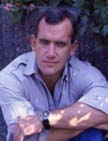 Dr. Alan Rabinowitz, referred to as the "Indiana Jones of Wildlife," has spent his life dedicated to the conservation of wildlife. He has traveled to many exotic areas and has committed himself enormously to saving jaguars.
Dr. Alan Rabinowitz, referred to as the "Indiana Jones of Wildlife," has spent his life dedicated to the conservation of wildlife. He has traveled to many exotic areas and has committed himself enormously to saving jaguars.
What some people may not be aware of is that Alan is a person who stutters. Alan spent his childhood avoiding speaking and only spoke when absolutely necessary. He discovered that he was able to speak fluently to the animals that were kept in his home. His stuttering sparked him into the path he now leads -- talking for the animals.
Currently Alan is the director for science and exploration for the Bronx Zoo-based Wildlife Conservation Society in New York and is still advocating for the conservation of jaguars. (Picture obtained from Wildlife Conservation Society)
For more information:
- http://www.stuttersfa.org/whatsnew/rabinow.htm
- http://wcs.org/7411?art=113889806&pg=0
- http://www.savvytraveler.org/show/features/2002/20020322/interview3.shtml
May 2004

